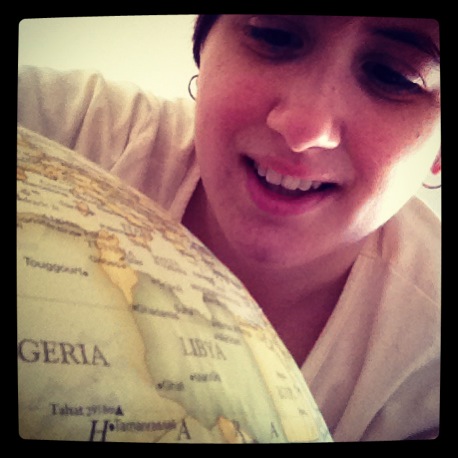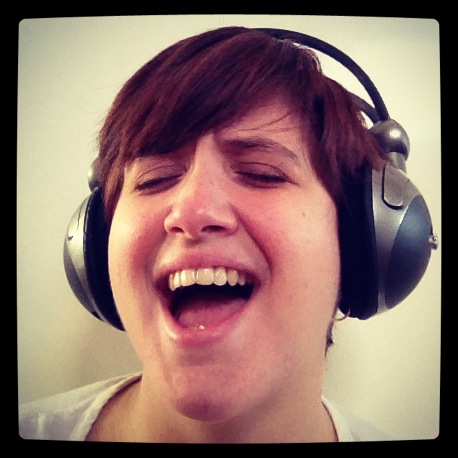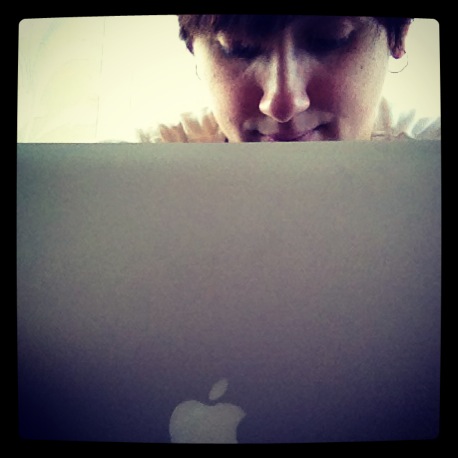|
I originally gave up my full time job in September 2009 for five months to write a book. I didn't know it was going to be for five months, but I'd given myself a six month deadline, not knowing how I would cope working in a completely different environment without people around me. The book was something I'd been working on for ten years and I was desperate to put it to bed so I could move on with other writing projects. I'm happy to say I achieved it. Five months later I went back into full time employment, found an agent, found a publisher and the book was finally out there.
Thinking I'd like to give being my own boss another go and explore more of the new publishing model, I started my freelancing journey at the beginning of 2012, but I quickly realised I was trying to cover too much ground. I was in the midst of a giant project (my 30 Things to do before I'm 30) and couldn't stop myself hurtling along. I'd already started two months later than planned and was cramming in lots of travel and so many activities. The plan did change as I moved through the months, and while I don't think this is necessarily a bad thing, I ended up branching even further out into the unknown. Looking back at it now, that year was more about having fun than concentrating on my writing, but I blurred the line. I wasn't clear on what I was trying to achieve. The original plan was to clear the decks whilst having fun, but I flipped that idea on myself. I even took up a part time job two thirds of the way into the year - and that definitely hadn't been part of the plan! So here's a few things from the second installment of my being my own boss I'd like to share with you: It sounds obvious but be clear on your objective. What is the ultimate goal here? First time around, I knew exactly what I wanted to accomplish and I did it. Second time, it was very confusing. And I caused that confusion on myself. Yes I had a fabulous year, but it was a completely different ending to what I'd originally intended. By the time I turned 30, I still had a mass of unfinished projects. Don't start freelancing in multiple projects unless you are extremely disciplined. I know I need very strict deadlines. I'm more effective when I work on one thing, see it through to completion and then move onto the next. It's also better for my frame of mind. Putting this to the test, in only four weeks (last month) I completed a couple of guides for freelancing and publishing and a poetry anthology. To put how amazing this is for me into perspective, these are projects I've been thinking about for a few years! Be ahead of the game, not continually running behind. In January 2012 I had a three week holiday in Canada and I was very relaxed and focused. Even coming in two months behind schedule appeared to be ok in my mind and I started out with the very best of intentions, but as soon as I got home, things spiralled. 30 Things plans completely overran any initial freelancing plans. Finally, depending on how you work best and your circumstances, if you feel yourself drifting away from the main goal, have the discipline to pull yourself back in the game. For me, in this particular case, until my 30 Things was over, there was no point in trying to do any serious freelance work. I had so many exciting things going on, it was impossible to focus. And I didn't feel so bad about this because 1) it was self induced and actually I was supposed to be going a little crazy and having fun and 2) I could see an end. Once I hit 30, it was crack down time.
0 Comments
So, am I bonkers?
That’s the question I set out to answer a month ago when I quit the day job and started fresh as a freelancer. The purpose of the blog series was to detail the details to help me (and you) on the rocky freelancing journey. We started off by discussing planning out the year (or time off) month by month and creating a resume to showcase your knowledge and experience, what topics you’re an authority on, and what skills and qualifications you have. Next we covered ideas for making money freelancing, setting up your new writing business and discovered that actually the subject of tax IS taxing! After boggling you all with tax, it was time to lay out the frame of mind foundations for being a writer and my 5 pointers for staying on track as a freelancer: Create your own definition of success based on what is important to YOU Be prepared to make sacrifices Don't panic if you lose your mojo, it happens! Bring yourself back to the status quo gradually Surround yourself with people who will support you Keep the vision clear so you keep moving forward How do you fight isolation, disorganisation and lack of motivation when you work from home? I covered 10 tips to combat these negatives. We were then staying focused by narrowing down our specialised topics and creating a marketing plan to give you a better idea of how to network with other businesses and writers each week. Next up was challenging ideas and thinking like an Editor, writing feature articles and avoiding content failure. Top tip! Worldwide Freelance is a fabulous resource for worldwide markets. Finally we looked at filling your Inbox with replies, how to invoice like a pro, tackle Writer’s Block and create the perfect work / life balance. Now that the 30 Things project is in full swing, it’s time to get serious! To wrap up my "Am I Bonkers?" blog series, I'm going to end with 3 simple ways to ensure you separate your work from your pleasure - which is really tricky when you're writing full time at home because your writing could be considered as both - and your "office" definitely is both!
Anyway, here goes: 1) Manage your contact's expectations so, in the age of fast and demanding comms, people know when to leave you alone. 2) Don't mix your working area with your living area. Create a home office that has a door you can close and walk away from when you're finished for the day. 3) Keep a notebook handy. I'm at my most creative when I don't want or mean to be creative. Jot the idea down and then get back to your fun! Let's face it, Blogger's drought is our worse nightmare. When the creative muse is dead, blogging without purpose is difficult, mentally exhausting work. I suffered with it last week, so I think it's a good opportunity to share my top 5 tips to help you pull through!
Here we go then: 1) Don't fight it, switch off and relax your brain for a while, even just watching some easy viewing tele or socialising 2) Use Twitter. Follow industry related people / magazines / organisations / fellow writers and bloggers. Something someone writes in your timeline will spark an idea, I guarantee it 3) Watch / do / read / listen to something that inspires you. It puts you in a better place to think about the things you enjoy. Music lyrics help me a lot 4) Make lists - 5 things to do when... / 3 tips to help with... 5) Write a word on a piece of paper. Imagine a situation around that word and a cheeky 6) Go to your nearest coffee bar, hide behind a paper or magazine and listen and observe the going ons around you... Notice I didn't mention exercise. This is a great way to energise not just your physical being, but your mental state too... However, who exercises when they're depressed, fed up and tired because the words aren't flowing? Certainly not me! Writer's Block - that dreaded crippling mindset we all fall into at some point - where the end of our career is looming because we're never going to be able to write again... I've been there. No ideas. Too many ideas. Veering away from the outline and hitting a dead end. The story / article is going in the wrong direction and I can't bring it back. I can't link A to C because B doesn't make sense. The characters have lost their impact. I hear critics in my head. The right words have deserted me. The one great idea I had has fizzled into nothingness. A large part of text I've written needs re-writing. Nothing is flowing - the plot, characters, words...
Basically, anything like the above that hinders you from being creative, I'm classing as Writer's Block. And it sucks. Oh yes, it sucks. But what can you do to get through it? Writing exercises are magic. They force you to keep writing and thinking in a creative capacity. Here are some of my favourites: 1) Write 10 potential titles of books you’d like to write. 2) Create a character. 3) Write a description of an exhilarating event you've personally encountered. How did it make you feel? 4) Write a poem about a memorable moment in your life. 5) Select a book on your shelf and pick two chapters at random. Take the first line of one chapter and the last line of the other chapter and write a short story (no more than 1000 words) using those lines as bookends to your story. 6) Rewrite a fairy tale from the baddie’s point of view. 7) Turn on your TV or radio or iTunes. Write down the first line that you hear and write something based on it. 8) Go for a coffee and listen in on a conversation. Turn what you hear into a short love story (no matter how much you have to twist what they say!) 9) Write the acknowledgments page that will be placed in your published book, thanking all the people who have helped you on the journey. Take a detour - either by heading in a direction with another scene, or going for a long walk. Write an up-to-date synopsis of your story scene by scene. This will help you keep track of your timeline and point out the places where you can deviate and then bring the story back in line again. Keep the first draft as a free flow. It doesn't help me, but try writing without letting spell check, grammar check and punctuation hinder you. Those checks can come later in the revisions. Some advice suggests to keep writing and battle through the block, but if you're literally banging your head on the desk out of sheer frustration, I'd say it's probably time for a serious break ;) If you're waiting to know whether you can guest post on a website, or waiting to hear back from a magazine Editor, make sure the email you sent was clear and concise to begin with. Here's what you should be checking for before you hit Send:
1) Don't be generic in the subject line. Guest post and Question are likely to be ignored, so try to be as descriptive as possible. Not as simple as it sounds, I know! 2) Keep the main body of the email short and concise. Avoid asking too many questions. 3) Be clear about your request. This could feature in the subject line, but at the very least it should be in the first paragraph of your email. 4) Proof read your email before sending. 5) Be sure to respond promptly once you get a reply. It sounds obvious enough, but I've been guilty of not! Writing great articles is only half the story - because if you're successful in getting published, you'll want to be paid promptly as well. Asking for payment is always difficult, but there are ways to be professional about it.
Spend the time negotiating a clear contract right from the outset I've worked in contracting in the Adventure travel biz for the last 10 years and trust me, any loop holes will come back to bite you in the bum at a later stage if they aren't ironed out at the beginning. Organise your invoice and billing system Build an invoice template to include the following: Your name Your company name (if different to your name) Your company mailing address Your email address and phone / fax numbers VAT number if VAT registered A unique number for identification - which will be useful to reconcile your accounts at a later stage Company name and address of the company you're invoicing Space for itemising services and expenses with a final total Invoice date (the date you create or send the invoice) Supply date (the date the goods or service were provided) Payment date (the date you expect to be paid - usually 30 days from receipt of invoice) Acceptable payment methods Find out who pays the bills, and when Be sure to ask where to send your invoice and who needs to receive a copy of it, then make a note of your contact in case there is a delay with payment. Keep a ledger to track your outgoing invoices and incoming payments Really important to know where you are at any given time! Don't just think about writing for your own country's magazines - think bigger than that.
Think Worldwide markets! With more and more submission guidelines allowing for emails, you don't even have to worry about postage costs. I've recently signed up to Worldwide Freelance, a mega useful resource on the thousands of markets available. This link will give you a taster: http://www.worldwidefreelance.com/freelance-writing/nonfiction-articles/73-10-writing-markets-for-new-writers Sometimes there will be disappointments when great content you've worked so hard on will fail to impress. This blog post will pinpoint the areas to watch out for and help you overcome the obstacles.
The subject matter hasn't been targeted I cannot stress enough the importance of researching your market and audience. You may have the best idea in the world but it will fall flat if you send it to the wrong magazine, or don't pitch it correctly to potentially the right magazine. The best advice I can give you is to read that magazine from cover to cover first and make a note of style, content, word length and article topics as you go through. Then while it's still fresh in your mind, build a readership profile. Rubbish title / headline Creating eye catching titles and headlines is an art and for most of us it doesn't come naturally. A great title is one that is actionable, brief, clear, definitive, and intriguing. Spend some time working on this. It's like anything, you'll get better the more you practice. No attention to detail Don't let a great piece of work go to waste because you didn't spell check it! Proof and edit your work preferably with the help of a friend. These next 3 are more related to blogging / website content, but still worth a mention. Lack of promotion There's a whole world of people out there and it's right on your doorstep courtesy of the internet. You took the time to write the piece, so now make the time to share your content with your friends, family and colleagues through social media sites Facebook, Twitter, Google+ and Blogger - to name a tiny minority. Not socially enabled What the heck does that mean? Basically add social media buttons to each post you write so people can click on them and share your content. This will give you more exposure. I'm still learning how to add these buttons to my site, more details to follow... No SEO Ok, now we're getting really techy and I've probably lost you...! I've talked about Search Engine Optimisation before. People will find your website by searching for you in Google, as an example. On a simple level, your website needs to be sprinkled with key words to help search engines pick up those words and therefore pick up your website. |
AuthorBlogging is an amazing concept so here I am giving it a whirl. You'll get words. You'll get pics. Sometimes a vid or two. You'll get tongue in cheek, the odd humble opinion and an honest insight into my travels and writing life. Maybe even a few gems along the way. I'll be musing on home turf as I see more and more of the UK and sharing my experiences further afield on holidays and adventurous trips across the globe. Archives
December 2022
Categories
All
|





 RSS Feed
RSS Feed
